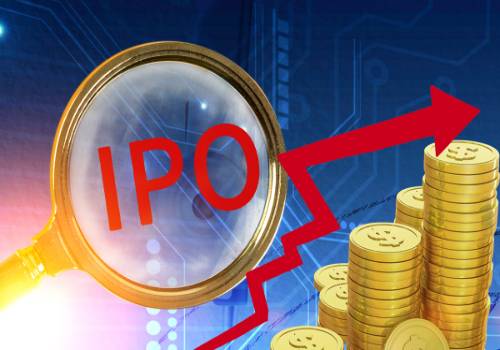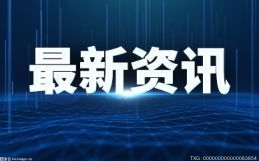Current broadcast: Yi Gang's voice is heavy on inflation and monetary policy

You may also be interested in:
-
Current report: On inflation and monetary policy, Yi Gang weighs heavily -
Immediate: 14 departments issue guidance for camping economy according to -
Daily report: The National Development and Reform Commission has carried out solid government data -
Global Today News | "Industry Upgrades" Move Space for Manufacturing -
Focus SMS! Ministry of Finance: From January to October, state-owned enterprises are operating -
International experience in the development of "specialized, special and new" enterprises -
Snowe Mining's equity auction will be held four times in seven days -
Quick information: self-employed businesses can do something in the field of political procurement
Today's Hot Spots
Recommended for you
The Ningxia Forestry and Grass Bureau can fully realize the whole network office
more
-
Focus on these two sectors or take the lead in breaking through after the major conference, and make a great contribution to the 23rd anniversary of the success of Barry -
Juhuasuan 99 Huasuan Festival content upgrading 5000 Taobao Tmall brands linkage carnival -
Innovation and change, transformation and strive to create close to the needs of the people, with temperature and responsibility -
Escort Beijing Life Insurance Co., Ltd. and the fifth batch of youth aid cadres and talents -
China Business CDP White Paper | Love Analysis Report -
I Love My Home Volunteer Service Team: Promote the Anti epidemic Spirit and Protect Community Peace -
Lianhua Qingwen, a traditional Chinese medicine, becomes a powerful weapon against the Omicron virus -
Lansheng Capital Liu Jun: Six Stages of the Growth of Stock Investors
more
-
Current broadcast: Yi Gang's voice is heavy on inflation and monetary policy -
Instant: 14 departments issue guidance, camping economy press the "accelerator" button for development -
Daily report: National Development and Reform Commission solidly carries out the construction of government data resource system -
Global Today News | "Industry Upgrades" Move Space for Manufacturing -
Focus SMS! Ministry of Finance: From January to October, the total operating revenue of state-owned enterprises kept growing year on year -
International experience in the development of "specialized, special and new" enterprises -
Snowe Mining shares auction 7 days four times circuit breaker mysterious bidder increased price by 196 million yuan strong capping -
Quick information: self-employed businesses can do something in the field of political procurement
Ranking
-
The Ministry of Finance has allocated 500 million yuan of water conservancy and disaster relief funds to support all regions to do a good job in flood safety and other related matters -
The number of China's free trade agreements has nearly doubled since a decade ago -
Small and medium-sized banks have reformed insurance, and the CBRC has said so -
National Development and Reform Commission: Grasp the planning of incremental policy tools and make full efforts to ensure supply and stable price of bulk commodities -
Dynamic focus: the added value of high-tech manufacturing increased 9.6% year on year -
Reduce the burden of enterprises and increase cash flow by more than 1.6 trillion yuan (new data and new insights) -
World news: In the first half of the year, the issuance and financing of the Beijing Stock Exchange and the New Third Board increased by nearly 20% year on year -
Global quick look | Empowering rural revitalization with brand construction and building a new pattern of quality agriculture -
Global dynamics: reverse repurchase small precise liquidity is reasonable and abundant -
World News: China's manufacturing industry accounts for nearly 30% of the global added value
Wonderful push
-
Global hot recommendation: look ahead to investment trends | join hands with Luoyang Office in Shenzhen to lead ZTE New Materials -
Current broadcast: Yi Gang's voice is heavy on inflation and monetary policy -
Instant: 14 departments issue guidance, camping economy press the "accelerator" button for development -
On inflation and monetary policy, Yi Gang made a big statement -
Daily report: National Development and Reform Commission solidly carries out the construction of government data resource system -
[Daily News] National Development and Reform Commission solidly carries out the construction of government data resource system -
14 The department issued guidance, and the camping economy pressed the "acceleration key" for development -
Focus bulletin! Ministry of Finance: From January to October, the total operating revenue of state-owned enterprises kept growing year on year -
Global Today News | "Industry Upgrades" Move Space for Manufacturing -
Hot! The Prospective Economist's Industry Observer Ranking List was released (the third issue) -
The latest news: "industrial upstairs" make room for manufacturing -
Focus SMS! Ministry of Finance: From January to October, the total operating revenue of state-owned enterprises kept growing year on year -
What is the ETF issuance mechanism? What are the characteristics and functions of ETF ETF funds? -
What is the sea of wisdom? How to build the ocean big data cloud platform? -
What is inclusive childcare service? What are the characteristics of inclusive childcare services? -
What is biological breeding? What does biological breeding technology include? -
What is small molecule innovative medicine? What is the difference between small molecule innovative drugs and macromolecular biological drugs? -
What is the new generation of information technology industry? What is the new generation information technology industry policy? -
Narrow band IoT? What is the difference between narrowband IoT and NB IoT? -
What is distributed storage? What is the difference between distributed storage and traditional storage? -
What are pharmaceutical intermediates? How are pharmaceutical intermediates classified? -
What is smart energy? Is science and technology the driving force of smart energy? -
What is smart medicine? How large is the market scale of smart medicine? -
Snowe Mining shares auction 7 days four times circuit breaker mysterious bidder increased price by 196 million yuan strong capping -
The total import and export volume of services in the first 10 months increased by 17.2% year on year -
International experience in the development of "specialized, special and new" enterprises -
Snowe Mining shares auction 7 days four times circuit breaker mysterious bidder increased price by 196 million yuan strong capping -
Quick information: self-employed businesses can do something in the field of political procurement -
Current focus: international experience in the development of "specialized, special and new" enterprises -
Focus message! The total import and export volume of services in the first 10 months increased by 17.2% year on year -
World Top: "Goalkeeper" Becomes "Forward" Organization to Enhance Combination Offensiveness -
Global Communications! Individual businesses can do something in the field of government procurement -
[Broadcast information] Will the "independence" of the 17 independent directors who have completed their shareholding increase this year be affected -
Express: Business pension does not enjoy personal tax preference -
Daily message! Beijing and other 10 provinces and cities will pilot commercial pension business -
Message! "Goalkeeper" to "Forward" Mechanism to Enhance Combined Offensiveness -
Business pension does not enjoy personal tax preference -
The central bank's month end reverse repo efforts increased - releasing positive signals to the market -
[World News] Beijing and other 10 provinces and cities will pilot commercial pension business -
World WeChat News: The central bank's reverse repo efforts increased at the end of the month - releasing positive signals to the market -
Strong support for fiscal expenditure No obvious gap in liquidity in December -
Strong support for fiscal expenditure No obvious gap in liquidity in December -
The list of top 100 cities in advanced manufacturing industry was released, and multiple measures were taken to promote the rapid and healthy development of advanced manufacturing industry -
Zhao Lijian said that China has made great efforts to ensure the stability of the global supply chain and promote the development of the world economy -
Daily News: Zhao Lijian said that in order to ensure the stability of the global production and supply chain and promote the world economy -
The list of the world's top 100 cities in advanced manufacturing industry has been released, and various measures have been taken to promote advanced manufacturing -
Viewpoint: The Ministry of Industry and Information Technology announced the list of advanced manufacturing clusters in 45 countries based on regional comparison -
Daily quick look: the Ministry of Industry and Information Technology announced the list of 45 national advanced manufacturing clusters based on the region -
Daily broadcast! Development and Reform Commissions all over the country work together to expand effective investment and stabilize the overall economy -
Colorectal cancer: I'm afraid you eat these foods! -
Know everything every day! Headline of prospective IPO: 2 times 2, Huilong Piston successfully passed the meeting! Diligence Resources -
Daily news: the last nail is being nailed on the "coffin board" of fuel vehicles -
Daily communication! The Ministry of Industry and Information Technology announced the list of 45 national advanced manufacturing clusters Beijing Tianjin Hebei Life -
Development and Reform Commissions all over the country work together to expand effective investment and stabilize the overall economy -
World news: The Ministry of Industry and Information Technology announced the list of 45 national advanced manufacturing clusters -
News: Ministry of Commerce: China's total service import and export in the first 10 months increased by 17.2% year-on-year to 4918.55 billion yuan -
Current speed reading: This change in the female brain during pregnancy may affect the mother baby relationship! -
Current observation: your child is more "smart" than you? The reason is -
Dinghe Insurance Company successfully won the bid for the operation period insurance project of Vietnam Yongxin Coal fired Power Plant Phase I Project -
"Time and space travel" has become a reality? Scientists have made new discoveries about wormholes! -
Everyday Micro Dynamics Where will China's top 100 industries go in the next decade? -
[Daily hot smell] 1. 9 billion a year! The two families have jointly run colleges and universities for 15 years -
Ministry of Commerce: China's total service import and export in the first 10 months increased by 17.2% year-on-year to 4918.55 billion yuan -
Development and Reform Commissions all over the country work together to expand effective investment and stabilize the overall economy -
Ministry of Finance: The total operating revenue of state-owned enterprises in the first 10 months increased 8.9% year on year -
Daily news! Steady growth requires renewed efforts -
The Research Institute of the Ministry of Commerce and Hehe Information Qixinbao released the report on business credit development index -
New global trends: Development and Reform Commissions all over the world work together to expand effective investment and stabilize the overall economy -
Look around the world! Report: Family wealth and income in the third quarter were basically the same as those in the previous quarter -
Steady growth requires renewed efforts -
Ministry of Finance: The total operating revenue of state-owned enterprises in the first 10 months increased 8.9% year on year -
World hotspot! Report: Family wealth and income in the third quarter were basically the same as those in the previous quarter -
Ministry of Finance: From January to October, the total operating revenue of state-owned enterprises was 66419.96 billion yuan, up 8.9% year on year -
Focus: The Research Institute of the Ministry of Commerce and Hehe Information Qixinbao released the report on business credit development index -
Ministry of Commerce: China's knowledge intensive service trade grew steadily from January to October -
Global SMS! Ministry of Finance: From January to October, the total operating revenue of state-owned enterprises was 66419.96 billion yuan -
Rolling: Ministry of Commerce: continue to play the role of the normalized exchange mechanism with foreign enterprises to help -
Ministry of Commerce: China's total import and export of services increased by 17.2% in the first 10 months -
Global hot discussion: Ministry of Commerce: China's service trade continued to grow from January to October -
News: Ministry of Commerce: China's total import and export of services in the first 10 months increased by 17.2% year on year -
Ministry of Commerce: China's total import and export of services in the first 10 months increased by 17.2% year on year -
Milk Pup Pup Punch Ningbo Hanji, Opening the Christmas Special Exhibition -
The other half doesn't tell you where to go when they go out? Teach you how to locate with one photo -
World hot: economic prosperity index has been declining continuously, and steady growth needs to be strengthened -
How to cook the thick tremella? Let's have a look -
What are the types of skin diseases infected? How to prevent skin diseases? -
Can people with high uric acid eat fruit? Can it prevent gout? -
Who has the smallest waist in the world? Myanmar Girl Breaks World Record -
What to watch now! The indicator of economic prosperity has continued to decline, and more efforts should be made to stabilize growth -
How should leukaemia patients eat when undergoing chemotherapy? -
What is DINK? Why do more and more people choose DINK? -
Do you know the six ways of mobile phone projection to play mobile games on TV? -
What are the good brands of water dispensers? How much is a household water dispenser? -
Why can't the money of Yu'e Bao be transferred out? Why can't I transfer out in real time? -
What does a woman mean when she says you are a bosom friend? -
What is Fourier's law of heat conduction? Is Fourier's law the basic law? -
What is the cleaning method of color inkjet printer? What are the precautions? -
Serving the real economy, the scale of A-share equity financing reached 1.45 trillion yuan in the year -
Daily WeChat News: Interpretation of the loss determination rules of the new judicial interpretation of false statements -
Global News: The Central Bank's Operation Releases Signals and the Attitude of Protecting Liquidity Remains unchanged
this Daily news
-
What are pharmaceutical intermediates? How are pharmaceutical intermediates classified? -
What is smart energy? Is science and technology the driving force of smart energy? -
What is smart medicine? How large is the market scale of smart medicine? -
What are the good brands of water dispensers? How much is a household water dispenser? -
Why can't the money of Yu'e Bao be transferred out? Why can't I transfer out in real time? -
What is Fourier's law of heat conduction? Is Fourier's law the basic law? -
Can we borrow money from WeChat micro loan? Is the interest rate for borrowing money high? -
How to check personal credit? How to judge the query results? -
How to check personal credit? Can I check the personal online banking of commercial banks? -
What is the reason for Alipay's monthly inexplicable deduction? How to cancel?








